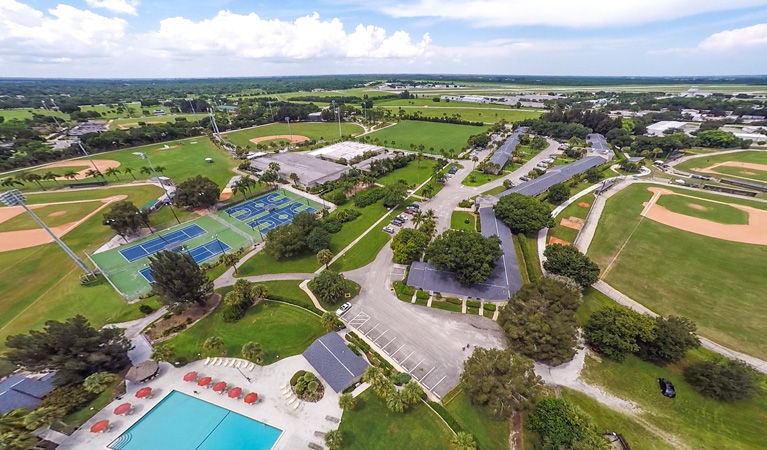
INDIAN RIVER COUNTY — A framed Sandy Koufax baseball jersey signed by the famed southpaw pitcher and other Dodgers memorabilia fill Historic Dodgertown executive Craig Callan’s spacious office that overlooks centerfield at Holman Stadium.
But there’s more than just old Dodgers goodies, which seem natural and fitting in this location. There’s the University of South Florida football helmet. And a Korean baseball team jersey signed by its players.
The non-Dodgers logo gear represents the revised business model and re-branding that continues to be tweaked at Historic Dodgertown, which is poised to turn a profit in 2016 for the first time in five years.
The one-time spring training complex of the former Brooklyn Dodgers and current Los Angeles team has been re-invented into an all-purpose sports center, one that includes a 110-by-150-yard field for soccer and football, sand for beach volleyball, and a large pool to augment its 10 baseball and softball fields.
And while high school and college baseball use still accounts for the single biggest source of revenue for the complex’s annual $5 million budget, the treasured place where Jackie Robinson helped integrate Major League Baseball is also generating income from professional football teams from Canada, elite swimmers from Denmark and Nova Scotia and rowers from colleges in Ohio and Michigan.
They’re all coming to a multi-sport hub once known as a mecca of spring training baseball to train for other sports – and help bolster Historic Dodgertown’s financial bottom line.
With this year-round business model, annual losses are getting smaller, said Callan, Historic Dodgertown vice president. The operation, he said, lost $138,000 in 2012; $83,000 in 2013; $35,000 in 2014 and $9,000 in 2015.
“For us to be an economic engine, we have to be everything from lacrosse to rugby to sand volleyball,” Callan said. “If you want a dominoes tournament, we’ll have a dominoes tournament. We’re not forgetting our roots, but we are expanding. Our business is year-round.”
The complex that was purchased by Indian River County for $16.8 million in 2001 faced tough financial times after the Dodgers left Florida for the Arizona desert in 2008. The once proud baseball field of dreams was renamed “Vero Beach Sports Village” – a major branding and marketing challenge – when previous Los Angeles Dodgers owner Frank McCourt declined to allow the county to use the Dodgertown name.
Enter another well-known name. Former Dodgers owner Peter O’Malley and his private company gained control of the old spring training complex by renting the site for a dollar a year in 2012 and established the 12-month approach to stirring up new business.
O’Malley successfully lobbied the current Dodgers owners to restore the Dodgertown mark after he gained control of the former spring training site and worked to create an all-purpose field for football and soccer from a former half-baseball field. O’Malley said as long as an O’Malley family member controls Historic Dodgertown, the “Dodgertown” mark can be used. He said the name is “key to the business plan.”
O’Malley runs Historic Dodgertown with 22 full-time employees and revenue is now generated year-round instead of during the six weeks in February and March of Dodger spring training.



